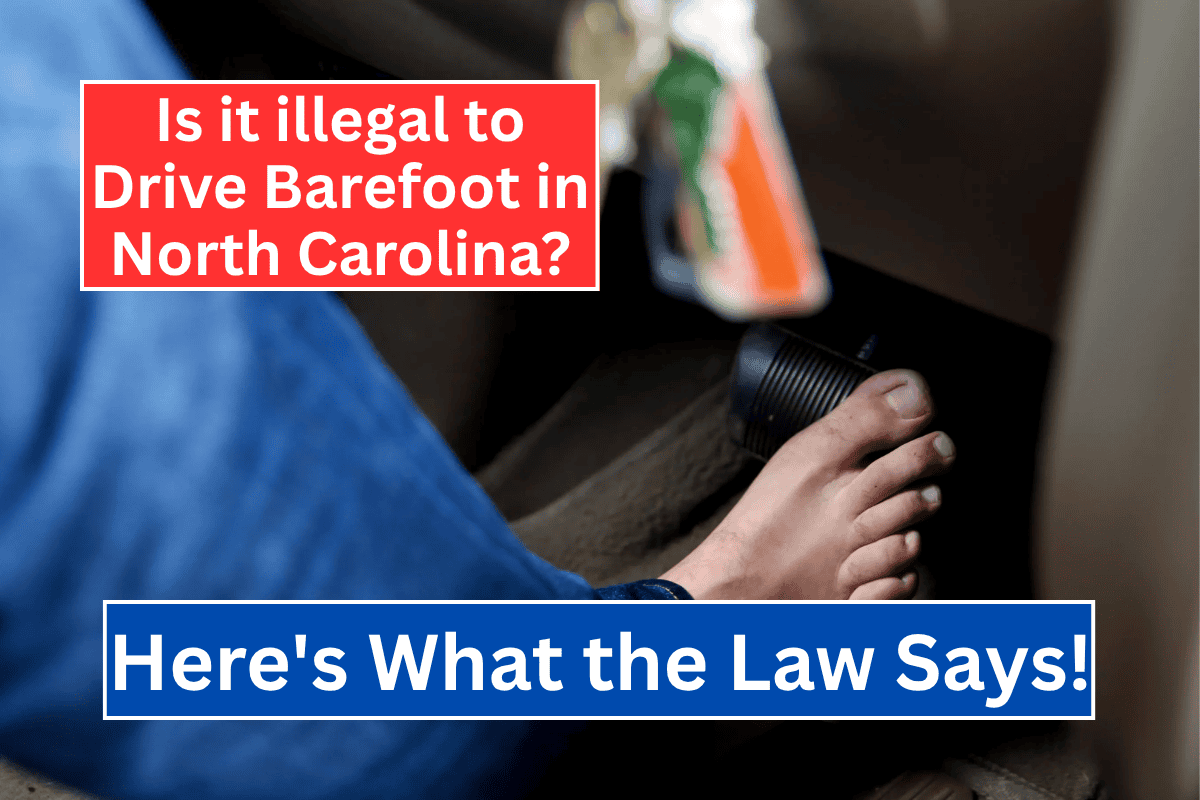If you’ve ever driven barefoot in North Carolina (NC) or wondered if it’s safe to do so, you’re not alone. Many drivers, especially during hot weather or after a day at the beach, might opt to drive without shoes.
But what does the law actually say about barefoot driving in NC? And is it really safe? Let’s take a look at the rules, safety concerns, and potential legal implications of driving barefoot in North Carolina.
Is Driving Barefoot Legal in North Carolina?
The short answer is yes, driving barefoot is legal in North Carolina. There are no laws in the state that specifically prohibit driving without shoes. In fact, it’s legal to drive barefoot in all 50 states in the U.S. However, just because it’s legal doesn’t mean it’s always the safest option, and there are potential risks involved.
Can You Be Cited for Driving Barefoot?
Although there is no law in NC that explicitly bans barefoot driving, law enforcement can still issue a citation if they believe your lack of footwear contributes to unsafe driving.
If an officer determines that driving barefoot caused a loss of control or a traffic incident, they may cite you for reckless driving or for failing to operate the vehicle safely.
In these situations, the absence of shoes could be viewed as contributing to negligence. For example, if driving barefoot causes your foot to slip off the brake or accelerator pedals, resulting in an accident, a police officer or insurance company could argue that your lack of proper footwear was a contributing factor to the crash.
How Can Barefoot Driving Affect Safety?
While barefoot driving is not illegal, safety should be your priority when operating a vehicle. Here’s how driving barefoot could negatively impact your ability to drive safely:
- Loss of Traction: Without shoes, your foot is more likely to slip off the gas or brake pedal, especially in wet conditions. This lack of traction can lead to slower reactions when you need to brake quickly.
- Reduced Control: Proper shoes offer the necessary grip to apply pressure evenly on the pedals. Without shoes, your foot may not make full contact with the pedal, making it harder to control the vehicle and increasing the risk of an accident.
- Foot Injuries: If you’re involved in a car crash, being barefoot can increase the risk of foot injuries from broken glass, debris, or other road hazards. Shoes help protect your feet in such situations.
- Delayed Reactions: Shoes, especially those with flat soles, help improve your ability to quickly pivot between the brake and accelerator pedals. Without shoes, it may take longer for you to react, increasing the chances of an accident.
Footwear Choices and Their Impact on Driving
While barefoot driving is legal, it’s important to recognize how different types of footwear can affect driving safety. Here’s a breakdown of how various footwear options can impact your ability to operate your vehicle:
- Flip-flops and Sandals: These types of shoes are not ideal for driving. They can easily slip off your feet and get caught under the pedals, making it difficult to brake or accelerate quickly when needed.
- High Heels: High heels can make it harder to apply consistent pressure on the gas and brake pedals. They alter the angle of your foot, which can cause difficulty when trying to pivot between the pedals or control the vehicle effectively.
- Barefoot: While barefoot driving may seem comfortable and provide better “feel” for the pedals, it still lacks adequate traction and control. In emergency situations, barefoot drivers may have slower reaction times and less stability.
- Sneakers or Flat Shoes: Closed-toe shoes, such as sneakers or flat shoes, are considered the safest footwear for driving. They provide the best grip and control, ensuring that you can safely press the pedals and react quickly to road situations.
Legal Implications and Insurance Concerns
While driving barefoot is not illegal, there are potential legal consequences if it leads to an accident. If an accident occurs and lack of proper footwear is seen as a contributing factor, insurance companies or the court may argue that you were negligent in your actions. This could impact the compensation you receive for damages or injuries in an accident.
For example, if you were driving barefoot and your foot slipped off the brake pedal, causing a collision, your ability to recover damages from the accident might be reduced due to your own role in the accident. If you’re in an accident and barefoot driving is involved, it’s important to contact an attorney to understand your legal rights and options.
Comparing North Carolina’s Laws to Other States
While North Carolina does not ban barefoot driving, it’s important to note that other states have different laws and guidelines:
- Alabama: Like North Carolina, there is no law explicitly banning barefoot driving, but an officer may still consider it reckless driving if it contributes to an accident.
- California: Barefoot driving is legal, but officers may issue a citation if it leads to unsafe driving or an accident.
- Missouri, Ohio, and Wisconsin: These states also do not have laws against driving barefoot, but driving without shoes can still be considered negligent if it leads to an accident.
Is It Worth Driving Barefoot?
While it is legal to drive barefoot in North Carolina, it’s important to remember the safety risks involved. Lack of proper footwear can reduce your control over the vehicle, especially in emergency situations.
Closed-toe shoes with good traction are always the safest choice for driving, as they offer the best grip and control over the pedals. Even if barefoot driving doesn’t carry legal penalties in North Carolina, wearing appropriate shoes is essential to ensuring your safety on the road.
If you’re involved in an accident while driving barefoot, or if you have concerns about how footwear might affect your legal situation, contact a traffic violation lawyer to discuss your case and get professional advice.












